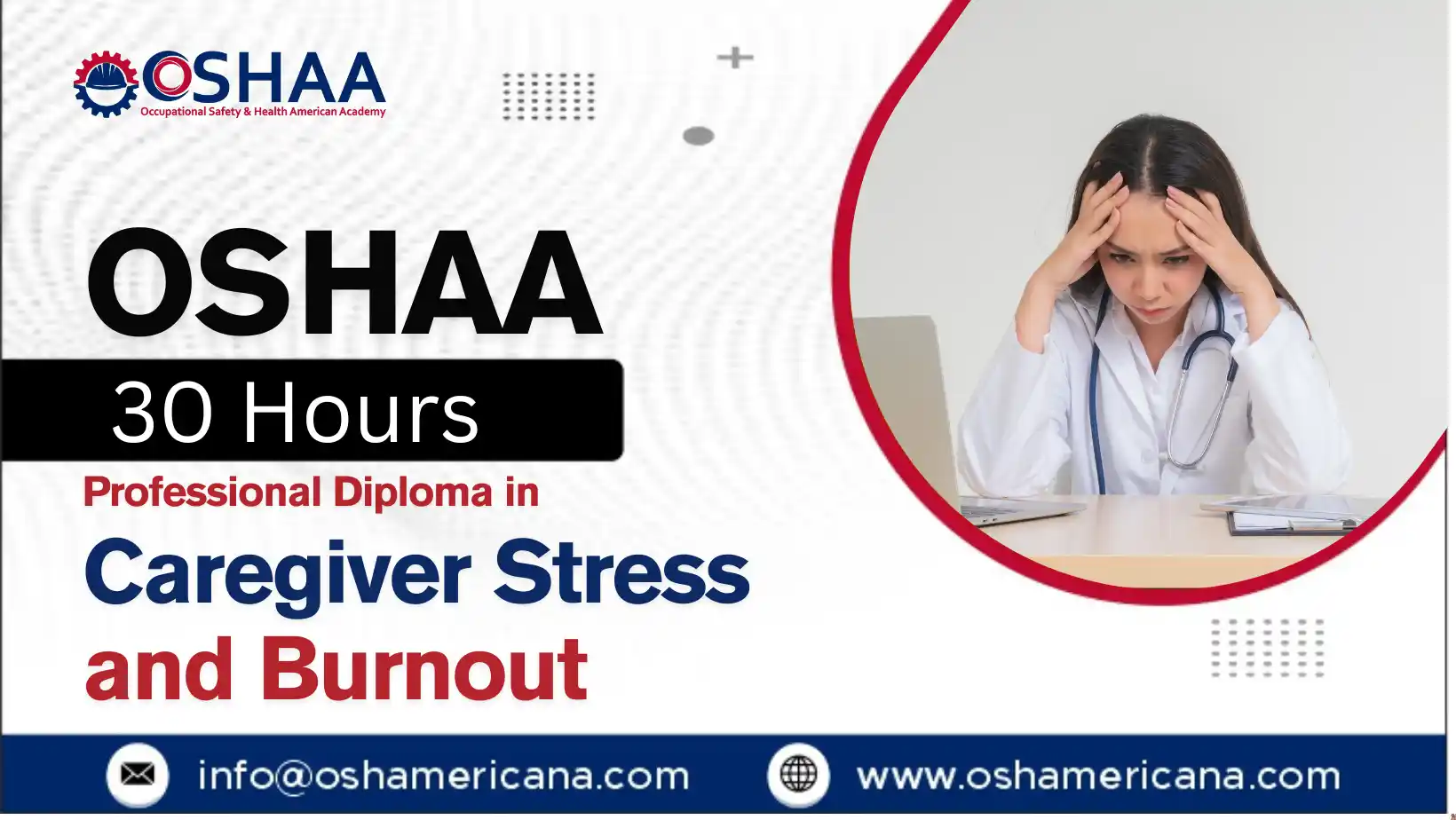Professional Diploma : Build Resilience and Enhance Wellbeing
The demands of caregiving, while essential and deeply meaningful, can place an immense psychological and physical strain on those providing support to others. The OSHAA 30-Hours Professional Diploma in Caregiver Stress and Burnout is specifically designed to address the growing need for education, strategies, and practical tools to recognise, prevent, and manage stress-related challenges faced by caregivers in both professional and personal settings.
This diploma offers a structured and insightful exploration into the nature of caregiver fatigue, emotional burden, and burnout, equipping participants with the skills to maintain wellbeing, build resilience, and deliver effective care without compromising their own health.
Caregiving often involves long hours, emotional engagement, and continual exposure to complex physical and psychological needs. Without adequate support and knowledge, the risks of compassion fatigue, anxiety, and burnout are significantly increased. This course provides participants with an in-depth understanding of stressors unique to caregiving roles, practical coping mechanisms, and evidence-based interventions that support sustainable caregiving practices.
OSHAA 30-Hours Professional Diploma in Caregiver Stress and Burnout
Study Units
Learning Outcomes
Understanding the Caregiver Role and its Challenges (3 hours)
- Describe the responsibilities and expectations associated with caregiving
- Identify the emotional, physical, and social demands placed on caregivers
- Understand the balance between personal wellbeing and caregiving duties
Recognising Signs and Symptoms of Stress and Burnout (6 hours)
- Identify early warning signs of stress and emotional exhaustion
- Differentiate between acute stress and chronic burnout
- Assess the impact of prolonged stress on daily functioning and care quality
- Understand how burnout affects relationships, motivation, and health
Psychological and Physiological Impact of Chronic Stress (4 hours)
- Explain the effects of chronic stress on the brain and body
- Understand the link between stress, anxiety, and depression
- Recognise the long-term health risks associated with unmanaged stress
- Analyse how chronic stress impairs decision-making and caregiving performance
Emotional Labour and Compassion Fatigue in Caregiving (3 hours)
- Define emotional labour and its relevance in caregiving contexts
- Recognise the symptoms and causes of compassion fatigue
- Understand how emotional demands influence caregiver wellbeing
- Apply techniques to mitigate emotional overload in caregiving roles
Self-Care Strategies and Mindfulness for Caregivers (4 hours)
- Implement practical self-care routines tailored to caregiving lifestyles
- Practise mindfulness techniques to reduce stress and promote calm
- Understand the importance of emotional regulation in care environments
- Integrate self-awareness exercises into daily caregiving routines
Setting Boundaries and Time Management Techniques (3 hours)
- Establish healthy boundaries to protect personal space and energy
- Apply effective time management tools to balance care and personal life
- Identify common boundary challenges and how to address them
- Improve scheduling and prioritisation to reduce overwhelm
Building Resilience and Emotional Strength (5 hours)
- Define personal resilience and its importance in caregiving roles
- Learn cognitive strategies to reframe stress and setbacks
- Strengthen emotional coping mechanisms for high-pressure situations
- Develop a personalised resilience plan to sustain long-term caregiving
Support Systems and Resources for Caregivers (2 hours)
- Identify local and national resources available to caregivers
- Understand the value of peer support and professional networks
- Learn how and when to seek help without stigma
- Build a network of support to reduce isolation and emotional burden
Course Benefits – OSHAA 30-Hours Professional Diploma in Caregiver Stress and Burnout
- Increases awareness of caregiver stress, burnout, and compassion fatigue
- Equips participants with practical tools to manage emotional and physical strain
- Enhances the ability to recognise early signs of stress and implement timely interventions
- Strengthens personal resilience and promotes long-term emotional wellbeing
- Encourages the development of sustainable self-care and mindfulness practices
- Supports healthy boundary-setting and time management in caregiving roles
- Promotes better care outcomes through improved caregiver stability and focus
- Provides access to evidence-based strategies for managing crisis and seeking support
- Helps participants build strong support systems and reduce isolation
- Offers a professionally recognised qualification to advance roles in caregiving and health support services
The OSHAA 30-Hours Professional Diploma in Caregiver Stress and Burnout is designed for participants who:
- Provide care in professional settings such as hospitals, care homes, or community health services
- Offer informal care to family members, friends, or individuals with long-term needs
- Experience emotional or physical strain as a result of caregiving responsibilities
- Seek to improve their personal wellbeing while continuing to provide quality care
- Wish to build resilience, set boundaries, and adopt sustainable self-care strategies
- Are in supervisory or supportive roles working with caregivers and want to understand their challenges
- Aim to prevent burnout and improve their ability to manage stress effectively in care-related environments







